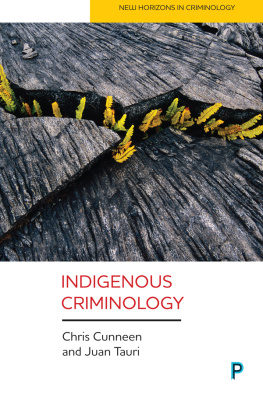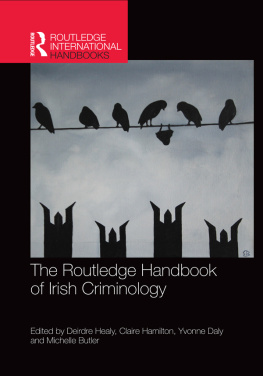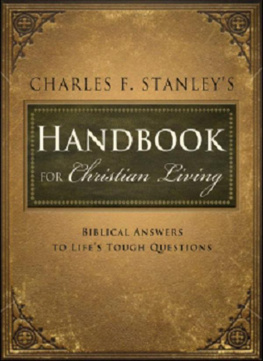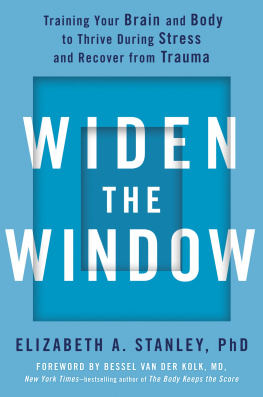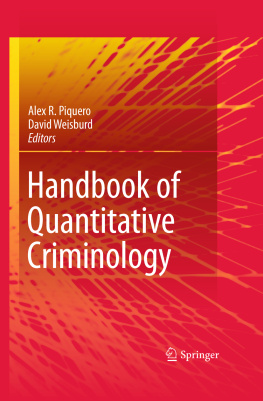Professor Elizabeth Stanley is an established, internationally recognised scholar in the areas of state crime, human rights, incarceration, and social justice. Her work is highly regarded for its originality, quality, and social impact. Her books include: Human Rights and Incarceration (edited collection, Palgrave, 2018); State Crime and Resistance (edited collection, Routledge, 2013); and Torture, Truth and Justice (Routledge, 2009). Her monograph The Road to Hell (Auckland University Press, 2016) contributed to the 2018 establishment of a Royal Commission into Abuse in Care in New Zealand. She held a prestigious Rutherford Discovery Fellowship from 2014 to 2019, and is director of the Institute of Criminology, and deputy head of the School of Social and Cultural Studies, at Te Herenga Waka Victoria University of Wellington.
Dr Trevor Bradley is a senior lecturer at the Institute of Criminology, Te Herenga Waka Victoria University of Wellington, where he teaches courses on policing and crime prevention. His ongoing programme of research focuses on plural policing in Aotearoa New Zealand, which incorporates private policing, security, and various citizen-led policing bodies. Recent projects have included an international research collaboration on intelligence-led policing, as well as work on volunteer community policing in New Zealand. His recent publications include a new edition of the book Introduction to Criminological Thought (Edify, 2019), as well as various articles on governance failures and poor standards in the New Zealand private security industry. In 2020, he co-authored articles on policing during the Covid-19 pandemic.
Dr Sarah Monod de Froideville is a lecturer at the Institute of Criminology, Te Herenga Waka Victoria University of Wellington. Her current research is broadly centred on harms to the environment in the New Zealand context, with a specific focus on (1) water-related harms and water security, (2) historical pollution, and (3) exploitative humananimal relations embedded into contemporary New Zealand culture. She also has an ongoing interest in the intersections between media representations, crime, and youth justice, stemming from her past work on moral panics in relation to young people. Early papers and her monograph Making Sense of Moral Panic: A framework for research (Palgrave, 2017) paid close attention to the changing shape of panics in neoliberal societies focused on preventing risk.
First published 2021
Auckland University Press
University of Auckland
Private Bag 92019
Auckland 1142
New Zealand
www.aucklanduniversitypress.co.nz
Elizabeth Stanley, Trevor Bradley, Sarah Monod de Froideville, and the contributors, 2021
ISBN 978 1 77671 078 2
A catalogue record for this book is available from the National Library of New Zealand
This book is copyright. Apart from fair dealing for the purpose of private study, research, criticism or review, as permitted under the Copyright Act, no part may be reproduced by any process without prior permission of the publisher. The moral rights of the authors have been asserted.
Book design by WordsAlive Ltd
Cover design by Kalee Jackson
Cover image by Brendan Kitto
Contents
1
Introduction
Criminological Transformations
Elizabeth Stanley, Trevor Bradley, and Sarah Monod de Froideville
Criminological perspectives like the concerns of crime and justice are always in a process of transformation. This is nowhere more apparent than in Aotearoa New Zealand, where criminology has consolidated from its 1970s introduction at the Institute of Criminology, Victoria University of Wellington, to become an integral feature of teaching and research at most New Zealand universities. As this handbook shows, the discipline that has emerged is one which is led largely by critical, decolonising and feminist perspectives something that places New Zealand criminology at odds with dominant disciplinary approaches taken across other neoliberal states, including settler-states.
From the outside, it might be thought that this progressive disciplinary development has mirrored national policies and practices to crime problems. Internationally, New Zealand is often regarded as a place of innovation and imaginative approaches to combating crime. One example is the youth justice system, often described as world leading for its emphasis on diverting young people from the criminal justice apparatus, its focus on restorative justice and the involvement of whnau in formal proceedings. The development of specialised courts, such as Rangatahi Courts, is another. That our police do not yet routinely carry firearms on their person also sets New Zealand apart from almost all other nations.
Yet these approaches distract from some uncomfortable truths. Criminal justice issues in New Zealand are highly politicised, sensitive to the demands of populist lobby groups, and sensationalised by a news media dominated by commercial interests. In turn, New Zealand has also built intensely negative and socially harmful responses to crimes and criminal justice. This can be seen in many examples, from the entrenched use of imprisonment as a tool of colonial control and repression, to the limited protections afforded to women and children bearing the brunt of family and sexual violence, to the reticence to criminalise multiple harms committed by powerful individuals and institutions. In short, official responses to crime have emerged in highly contradictory ways. While there are signs of progressive ventures, the overwhelming sense is of a crime and criminal justice landscape that reflects and embeds wider structural relations of inequality, and which fails to alleviate pain, violence, and harm at individual, family, or community levels.
Critics from academic, social, legal, and even government quarters have been instrumental in drawing attention to these entrenched problems, yet often to muted responses. In 2018, the newly elected Labour government launched several criminal-justice related initiatives including an advisory group, Te Uep Hpai i te Ora, that reported on the profound need for transformative approaches to crimes and social harms. Whether we will see substantive shifts resulting from the groups recommendations is another matter. Many of Te Ueps recommendations mirrored those from Moana Jacksons 1988 report The Maori and the Criminal Justice System: A new perspective: He whaipaanga hou. Despite Jacksons astute and evidence-based critique of New Zealands monocultural system and its role in disproportionately criminalising Mori communities, few changes if any have been implemented over the following four decades. In the same way, other landmark reports such as Puao-Te-Ata-Tu / Daybreak (1989) or Te Ara Hou / The New Way (1989), which sought to challenge the racism, discrimination, and inequities of criminal and welfare systems began to gather dust almost as soon as they were published. More recent critical commentaries around issues such as detaining young people in police cells, inhumane treatments and conditions in prisons, or police pursuits of fleeing drivers have also been met with limited actions for improvements in practice. Suffice to say, from the mid-1980s there has been a troubling trajectory in New Zealands political leadership of dismissing expertise and evidence in favour of quick-fix, often populist policies that have exacerbated problems at significant expense. It is not incidental that this approach has coincided with an acceleration of a neoliberal agenda that has also dominated justice-sector thinking.




